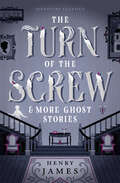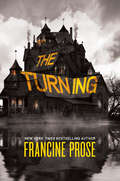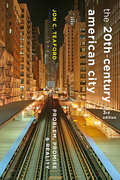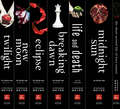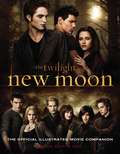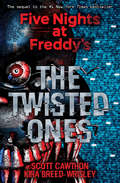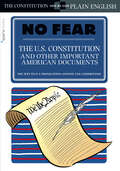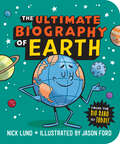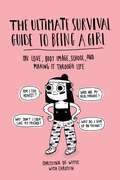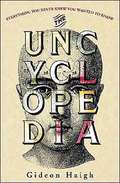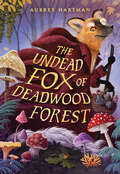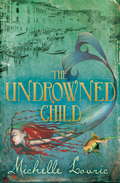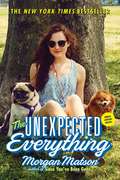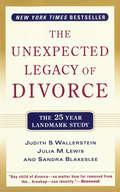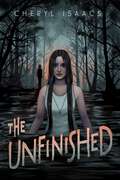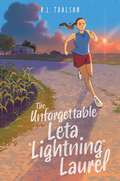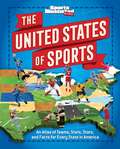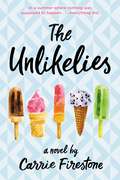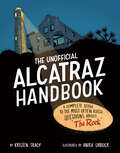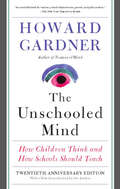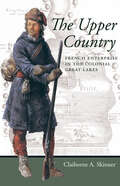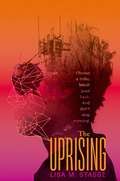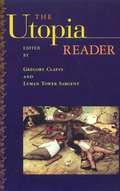- Table View
- List View
The Turn of the Screw & More Ghost Stories (Children's Signature Editions)
by Henry JamesThe Turn of the Screw, a novella written by Henry James in 1898, is perhaps one of the most widely read ghost stories in classrooms across the country. The story&’s ambiguity and characters&’ unreliability also mark the book as a work of impressionism, an important literary movement that&’s often left out of the children&’s literary &“canon.&” While best-known for The Turn of the Screw, James wrote many ghost stories during his illustrious career. &“The Romance of Certain Old Clothes&” and &“The Ghostly Rental&” are two of those short stories that young readers will enjoy reading, featuring relatively accessible plots and writing.
The Turning
by Francine ProseA dark house.An isolated island.Strange dreams and even stranger visions . . . Jack is spending the summer on a private island far from modern conveniences. No Wi-Fi, no cell service, no one else on the island but a housekeeper and the two very peculiar children in his care. The first time Jack sees the huge black mansion atop a windswept hill, he senses something cold, something more sinister than even the dark house itself.Soon, he feels terribly isolated and alone. Yet he is not alone. The house has visitors—peering in the windows, staring from across the shore. But why doesn't anyone else see them . . . and what do they want? As secrets are revealed and darker truths surface, Jack desperately struggles to maintain a grip on reality. He knows what he sees, and he isn't crazy. . . . Or is he?From nationally acclaimed author Francine Prose comes a mind-bending story that will leave you realizing how subtle the lines that separate reality, imagination, and insanity really are.
The Twelve Dates of Christmas (The Romantic Comedies)
by Catherine HapkaLexi's feeling a little holidazed this winter.... Lexi's been going out with Cameron for way too long. Sure, he's a nice guy, but there's a spark missing between them. So she comes up with the perfect plan: get him to fall for another girl so she'll be free -- and guilt-free, too. But when Lexi sees Cameron looking awfully cozy with Jaylene, her heart melts, especially when her budding psychologist best friend tells her that once a new couple has gone out a dozen times, their relationship is pretty much set. Cameron's twelfth date with Jaylene -- the Christmas Ball -- is coming up. Can Lexi find a way to rekindle her relationship with Cameron in the (saint) nick of time?
The Twentieth-Century American City: Problem, Promise, and Reality (The American Moment)
by Jon C. TeafordModern cities embody America’s successes and failures—while offering hope for the future.Throughout the twentieth century, the city was deemed a problematic space, one that Americans urgently needed to improve. Although cities from New York to Los Angeles served as grand monuments to wealth and enterprise, they also reflected the social and economic fragmentation of the nation. Race, ethnicity, and class splintered the metropolis both literally and figuratively, thwarting efforts to create a harmonious whole. The urban landscape revealed what was right—and wrong—with both the country and its citizens’ way of life. In this thoroughly revised edition of his highly acclaimed book, Jon C. Teaford updates the story of urban America by expanding his discussion to cover the end of the twentieth century and the first years of the next millennium. A new chapter on urban revival initiatives at the close of the century focuses on the fight over suburban sprawl as well as the mixed success of reimagining historic urban cores as hip new residential and cultural hubs. The book also explores the effects of the late-century immigration boom from Latin America and Asia, which has complicated the metropolitan ethnic portrait.Drawing on wide-ranging primary and secondary sources, Teaford describes the complex social, political, economic, and physical development of US urban areas over the course of the long twentieth century. Touching on aging central cities, technoburbs, and the ongoing conflict between inner-city poverty and urban boosterism, The Twentieth-Century American City offers a broad, accessible overview of America’s persistent struggle for a better city.
The Twilight Saga Complete Collection
by Stephenie MeyerA gorgeous paperback boxed set of the Twilight Saga featuring the latest #1 NYT and USA Today bestseller, Midnight Sun, and the rest of the series with a bold, fresh designThis stunning gift set includes paperback editions of Twilight, New Moon, Eclipse, Breaking Dawn, Midnight Sun, The Short Second Life of Bree Tanner, and Life & Death, making it the prime gift for fans of the bestselling series.Deeply romantic and extraordinarily suspenseful, The Twilight Saga captures the struggle between defying our instincts and satisfying our desires.
The Twilight Saga New Moon: The Official Illustrated Movie Companion
by Mark Cotta VazPhotos and interviews from the cast and crew of the Twilight movies.
The Twisted Ones: Five Nights at Freddy’s (Five Nights At Freddy's #2)
by Kira Breed-Wrisley Scott CawthonThe chilling sequel to the #1 New York Times bestselling novel Five Nights at Freddy's: The Silver Eyes from the creator of the acclaimed horror video game series.The highly anticipated sequel to the bestselling Five Nights at Freddy's: The Silver Eyes.It's been a year since the horrific events at Freddy Fazbear's Pizza, and Charlie is just trying to move on. Even with the excitement of a new school and a fresh start, she's still haunted by nightmares of a masked murderer and four gruesome animatronic puppets. Charlie thinks her ordeal is over, but when a series of bodies are discovered near her schoolbearing wounds that are disturbingly familiar she finds herself drawn back into the world of her father's frightening creations. Something twisted is hunting Charlie, and this time if it finds her, it's not letting her go.
The U.S. Constitution and Other Important American Documents (No Fear #4)
by SparkNotesUnderstand the documents that made America the nation it is today!The Declaration of Independence The Articles of Confederation The Constitution The Gettysburg Address These documents have all helped define the fundamental laws, beliefs, and history of the United States. Each one served a different function and altered the way Americans perceived their country. This No Fear compilation presents their original texts side-by-side with modern translations; it doesn&’t interpret—especially where the writers have deliberately left things vague—but simply modernizes the language so readers can draw their own conclusions. There never was a better, more necessary time for this illuminating book.
The Ultimate Biography of Earth: From the Big Bang to Today!
by Nick LundThe story of planet Earth, its history and how and why it changes over time, for kids 10 and up. Here's Earth's "biography" through the eras, eons, and ages, including extinction events (sorry, dinosaurs!) and introduction of new species (hello, humans!), told in biography form, with lots of humor, illustrations, and facts.
The Ultimate Survival Guide to Being a Girl: On Love, Body Image, School, and Making It Through Life
by Christina De WitteAddressing the struggles of young girls everywhere, this hilariously relatable comic guide to life provides real advice and encourages a new generation of teen girls to find confidence and embrace individuality.With friends, love, social media, body image, and more--navigating young adulthood can seem impossible. The Ultimate Survival Guide to Being a Girl provides humorous and highly relatable guidelines for all of the struggles young girls face, presented in author Christina De Witte's signature comic style and told from the point of view of her lovable Instagram and Internet character, Chrostin. A Hyperbole and a Half for the young adult audience, the book includes comics and hands-on advice about serious issues like mental health and self-care, and also deals with questions on every young girl's mind, like "Can you survive on pizza alone?" Quirky, hilarious, and sincere, The Ultimate Survival Guide to Being a Girl empowers young women to challenge society's unrealistic standards of beauty and embrace their individuality. This is sure to be a favorite for teen girls. Table of Contents Chapter One: Mental Stuff Chapter Two: The Beauty of the Human Booty Chapter Three: On Food Comas and Food Babies Chapter Four: Fashion No-No or Fashion Guru? Chapter Five: Friends and Family Business Chapter Six: Love Is Beautiful/Sucks Chapter Seven: School and Work, Work, Work, Work, Work Chapter Eight: The Internet of Things Chapter Nine: Society vs. Me Chapter Ten: United in Diversity
The Uncyclopedia
by Gideon HaighMake way for this defiantly idiosyncratic, hilariously illuminating compendium of curiosities you never knew you wanted to know! How do you flirt in Turkish? How do you dump someone in Japanese? What are the names of all the animals ever sent into space? These are just some of the fun and insightful oddities that made Gideon Haigh's The Uncyclopedia a hit overseas. The first ever encyclopedia for the curious, The Uncyclopedia is a compendium of illuminating knowledge and a delight for all inquisitive readers. As proved by Schott's Original Miscellany and the enormous rise in popularity of quiz and trivia nights, arcane knowledge and non-essential facts have never been so popular. At last in one convenient volume, everything for knowledge-hungry readers: Lists of Norse gods Suicide notes of the famous All anyone needs to know about How to toast in 10 languages A list of all the men to walk on the moon Twenty Latin mottoes Fortune-telling techniques Neither trivial nor essential, yet always engaging and illuminating, The Uncyclopedia is the reference book referred to purely for the purposes of amusement--and readers just can't put it down!
The Undead Fox of Deadwood Forest
by Aubrey HartmanThis delightfully grim tale follows Clare, the lonely, undying Usher of souls to the Afterlife, as an unexpected friendship turns his solitary life upside down and takes him on a heartwarming exploration of moving on. Perfect for fans of Kate DiCamillo and Tim Burton! Clare is the undead fox of Deadwood Forest. Here, leaves grow in a perpetual state of fall: not quite dead, but not quite alive—just like Clare. Long ago, he was struck by a car, and, hovering between life and death, he was given the choice to either cross into the Afterlife or become an Usher of wandering souls. Clare chose the latter: a solitary life of guiding souls to their final resting place. Clare&’s quiet and predictable days are met with upheaval when a badger soul named Gingersnipes knocks on his door. Despite Clare&’s efforts to usher her into the Afterlife, the badger is unable to leave Deadwood. This is unprecedented. Baffling. A disturbing mystery which threatens the delicate balance between the living and the dead. Desperate for help, Clare and Gingersnipes set out on a treacherous journey to find Hesterfowl—the visionary grouse who recently foretold of turmoil in Deadwood. But upon their arrival, Hesterfowl divulges a shocking revelation that leaves Clare devastated, outraged, and determined to do anything to change his fate.
The Undrowned Child (Undrowned Child Ser.)
by Michelle LovricIt's the beginning of the 20th century; the age of scientific progress. But for Venice the future looks bleak. A conference of scientists assembles to address the problems, among whose delegates are the parents of twelve-year-old Teodora. Within days of her arrival, she is subsumed into the secret life of Venice: a world in which salty-tongued mermaids run subversive printing presses, ghosts good and bad patrol the streets and librarians turn fluidly into cats. A battle against forces determined to destroy the city once and for all quickly ensues. Only Teo, the undrowned child who survived a tragic accident as a baby, can go 'between the linings' to subvert evil and restore order.
The Unexpected Everything
by Morgan MatsonAndie must learn to embrace the beauty in chaos in this New York Times bestselling novel about friendship, finding yourself, and all the joys in life that happen while you’re busy making other plans.Andie has a plan. And she always sticks to her plan. Future? A top-tier medical school. Dad? Avoid him as much as possible (which isn’t that hard considering he’s a Congressman and he’s never around). Friends? Palmer, Bri, and Toby—pretty much the most awesome people on the planet, who needs anyone else? Relationships? No one’s worth more than three weeks. So it’s no surprise that Andie has her summer all planned out too. Until a political scandal costs Andie her summer pre-med internship, and lands both she and Dad back in the same house together for the first time in years. Suddenly she’s doing things that aren’t Andie at all—working as a dog walker, doing an epic scavenger hunt with her dad, and maybe, just maybe, letting the super cute Clark get closer than she expected. Palmer, Bri, and Toby tell her to embrace all the chaos, but can she really let go of her control?
The Unexpected Legacy of Divorce: A 25 Year Landmark Study
by Sandra Blakeslee Julia M. LewisDivorce is at once a widespread reality and a painful decision, so it is no surprise that this landmark study of its long-term effects should both spark debate and find a large audience.In this compelling, thought-provoking book, Judith Wallerstein explains that, while children do learn to cope with divorce, it in fact takes its greatest toll in adulthood, when the sons and daughters of divorced parents embark on romantic relationships of their own. Wallerstein sensitively illustrates how children of divorce often feel that their relationships are doomed, seek to avoid conflict, and fear commitment. Failure in their loving relationships often seems to them preordained, even when things are going smoothly. As Wallerstein checks in on the adults she first encountered as youngsters more than twenty-five years ago, she finds that their experiences mesh with those of the millions of other children of divorce, who will find themselves on every page.With more than 100,000 copies in print, The Unexpected Legacy of Divorce spent three weeks on the New York Times, San Francisco Chronicle, and Denver Post bestseller lists. The book was also featured on two episodes of Oprah as well as on the front cover of Time and the New York Times Book Review.
The Unfinished
by Cheryl IsaacsIn her stunning debut, Cheryl Isaacs (Mohawk) pulls the reader into an unsettling tale of monsters, mystery, and secrets that refuse to stay submerged.When small-town athlete Avery’s morning run leads her to a strange pond in the middle of the forest, she awakens a horror the townspeople of Crook’s Falls have long forgotten.The black water has been waiting. Watching. Hungry for the souls it needs to survive. Avery can smell the water, see it flooding everywhere; she thinks she's losing her mind. And as the black water haunts Avery—taking a new form each time—people in town begin to go missing.Though Avery had heard whispers of monsters from her Kanien’kéha:ka (Mohawk) relatives, she has never really connected to her Indigenous culture or understood the stories. But the Elders she has distanced herself from now may have the answers she needs.When Key, her best friend and longtime crush, is the next to disappear, Avery is faced with a choice: listen to the Kanien’kéha:ka and save the town but lose her friend forever…or listen to her heart and risk everything to get Key back.An unmissable horror novel for readers who devoured Trang Thanh Tran’s She Is a Haunting or Claire Legrand’s Sawkill Girls!
The Unforgettable Leta "Lightning" Laurel
by R.L. ToalsonA determined girl athlete deals with food insecurity and a new rivalry challenging her feminist ideals in this &“resonant&” (School Library Journal, starred review) upper middle grade coming-of-age story from author of The First Magnificent Summer, R.L. Toalson.Eighth-grader Leta &“Lightning&” Laurel is a big sister, a problem solver, and the star of her track team. Her dad&’s been out of the picture for more than a year, and food&’s gotten scarce at home. When Leta learns her mom&’s financial struggles are even worse than she&’d thought, she hatches a plan to bring her dad home: she&’ll win district champion in the 400-meter dash, the newspaper will write about her, her mom will send the clipping to her dad, and her dad will remember he has daughters who need him. Because she&’ll be unforgettable. It should be easy; no one can beat her in the 400. But a new runner shows up, threatening Leta&’s top spot and her budding feminist beliefs about sisterhood. She works harder and harder in practice, trying to ensure the new girl won&’t ruin her perfect plan…until an injury sidelines her. How will she ever prove to her dad and the world that she&’s unforgettable? How will she prove it to herself?
The United States of Sports: An Atlas of Teams, Stats, Stars, and Facts for Every State in America (A Sports Illustrated Kids Book)
by Bill SykenThe United States of Sports takes kids on a first-of-its-kind journey across the U.S. with stops in every state in the union. Super cool maps with unique hand-illustrated icons show where all the great sites can be found, including arenas, stadiums, halls of fame, championship golf clubs, the greatest ski mountains, Olympic cities, and more. Each state’s Greatest Moments and homegrown heroes are pro led, and we wouldn’t forget to run down all the numbers! Championships, pro teams, famous events, and more— spread by spread—it’s the book to pore over this season.
The Unlikelies
by Carrie Firestone<p>Rising high school senior Sadie is bracing herself for a long, lonely, and boring summer. But things take an unexpected turn when she steps in to help rescue a baby in distress and a video of her good deed goes viral. <p>Suddenly internet-famous, Sadie's summer changes for the better when she's introduced to other "hometown heroes." These five very different teens form an unlikely alliance to secretly right local wrongs, but when they try to help a heroin-using friend, they get in over their heads and discover that there might be truth in the saying "no good deed goes unpunished." Can Sadie and her new friends make it through the summer with their friendships--and anonymity--intact? <p>This rich and thought-provoking novel takes on timely issues and timeless experiences with a winning combination of romance, humor, and wisdom. </p>
The Unofficial Alcatraz Handbook: A Complete Guide to the Most Often Asked Questions about "The Rock"
by Kristen TracyGet to know the history and mysteries of Alcatraz Island, home to one of the world's most famous prisons. This landmark off the coast of San Francisco was once home to many well-known criminals, including Al Capone.Former Alcatraz Island volunteer and seasoned author Kristen Tracy takes young readers on an adventure through the historic prison's grounds in this dynamically illustrated book packed with interesting facts and important stories. From individual cells in the Main Cellhouse to the ruins of the Warden's House, readers will get an in-depth tour of the island and its buildings. Tracy also shares important stories about how Alcatraz got its name, famous escape attempts, the gardens and the birds of the island, as well as the Native American groups who once occupied "The Rock."Award-winning illustrator Anika Orrock highlights the island&’s beautiful (and also grim) history with stunning artwork that brings to life this mysterious island. Author Kristen Tracy brings her personality-filled writing to a classic topic sure to be a hit with young readers. Written with a sharp eye for detail and an occasionally comedic voice, this book provides curious kids with a compact yet thorough history of America&’s most notorious prison island.
The Unschooled Mind: How Children Think and How Schools Should Teach
by Howard GardnerMerging cognitive science with educational agenda, Gardner makes an eloquent case for restructuring our schools by showing just how ill-suited our minds and natural patterns of learning are to the prevailing modes of education. This reissue includes a new introduction by the author.
The Unwritten Rules of PhD Research (Second Edition)
by Gordon Rugg Marian PetreThis book on the process of PhD research, provides readers with engaging discussion and comprehensive guidance on aspects covering all the key topics of the previous edition, including what a PhD is really about, how to do one well, how to decipher what your supervisor actually means by terms like 'good referencing' and 'clean research question' and how to design, report and defend your research, the authors continue to offer an accessible, down-to-earth, and insightful account of the whole PhD process..
The Upper Country: French Enterprise in the Colonial Great Lakes (Regional Perspectives on Early America)
by Claiborne A. SkinnerThe Upper Country melds myth and conventional history to provide a memorable tale of French designs in the middle of what became the United States. Putting the reader on the battlefields, at the trading posts, and on the rivers with voyageurs and their allies from the Indian nations, Claiborne Skinner reveals the saintly missionaries and jolly fur traders of popular myth as agents of a hard-nosed, often ruthless, imperial endeavor. Skinner’s engaging narrative takes the reader through daily life at posts like Forts Saint Louis and Michilimakinac, illuminates the complexities of interracial marriage with the courtship of Michel Aco at Peoria, and explains how France's New World adventurism played a role in the outbreak of the Seven Years War and the beginning of the modern era.In this story, many of the traditional heroes and villains of American history take on surprising roles. The last Stuart kings of England seem shrewd and even human; George Washington makes his debut appearance on the stage of history by assassinating a French officer and plunging Europe into the first truly global war. From unthinkable hardship to dreams of fur trade profits, this fascinating exploration sheds new light on France and its imperial venture into the Great Lakes.
The Uprising: The Forsaken Trilogy (The Forsaken Trilogy)
by Lisa M. StasseIn this dystopian sequel to The Forsaken, Alenna has survived the brutality of life on the wheel—but her fight is not over yet.Alenna escaped. It was expected that she would die on the wheel, the island where would-be criminals are sent as directed by the UNA—the totalitarian supercountry that was once the United States, Mexico, and Canada. But Alenna and her boyfriend, Liam, made it to safety. Except safety, they will soon learn, is relative. In order to bring down the UNA, they must first gain control of the wheel. If the mission succeeds, the wheel will become a base of revolution. But between betrayals, a new Monk leading a more organized army of Drones, and the discovery of a previously unknown contingent, Alenna, Liam, and their allies might be in over their heads. One thing Alenna knows for sure: There will be a reckoning. And not everyone she loves will make it out alive.
The Utopia Reader
by Gregory Claeys Lyman Tower SargentUtopian literature has given voice to the hopes and fears of the human race from its earliest days to the present. The only single-volume anthology of its kind,The Utopia Reader encompasses the entire spectrum and history of utopian writing-from the Old Testament and Plato's Republic, to Sir Thomas More's Utopia and George Orwell's twentieth century dystopia,Nineteen Eighty-Four, through to the present day. The editors of this definitive collection demonstrate the various ways in which utopias have been used throughout history as veiled criticism of existing conditions and how peoples excluded from the dominant discourse-such as women and minorities-have used the form to imagine empowering alternatives to present circumstances. An engaging tour through the dissident, polemic, and satirical tradition of utopian writing,The Utopia Reader ultimately provides a telling portrait of civilization's persistent need to imagine and construct ideal societies.
